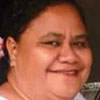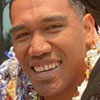Yes, our isolation has been a distinct advantage, but keeping Tonga COVID-19 free, comes with much hard work at the borders to keep it that way. It is important to learn and accept new sanitation and hygiene etiquettes during this time of global pandemic, when we are preparing for the novel coronavirus to reach our shores. World Environmental Health Day reminds us of the importance of public health intervention in preventing people becoming ill with COVID-19. No country is immune.



By Sela Akolo Fa'u, Viliami Tongamana and Denise Tully
Environmental Health Officers and Public Health Inspectors have an important job of keeping people out of hospital, through improving their quality of life and ensuring that the fundamentals of good healthy living, such as safe food, water, environment and housing, are maintained. This role has become more critical during the global pandemic of the novel coronavirus, COVID-19.
World Environmental Health Day, marked on Saturday 26 September 2020, reminds us that it is Environmental Health Officers and Public Health Inspectors who are taking action throughout the world to try and prevent people becoming ill with COVID-19.
Tonga and other Pacific Island countries are currently succeeding in keeping COVID-19 at bay, while others are struggling with keeping the cases to a minimum level, so it does not overwhelm their fragile health systems.
Tonga’s bigger neighbours, Australia and New Zealand, although not COVID-19 free, have performed better than most countries around the world. Yes, our isolation has been a distinct advantage, but keeping Tonga COVID-19 free, comes with much hard work at the borders to keep it that way.
Environmental Health Officers (EHOs) need to be very knowledgeable in all aspects of this new virus. They need to understand how it is spread, how it could reach Tonga, and how to control, isolate and shut down any potential outbreaks by quickly identifying cases through testing, locating and quarantining their close contacts.
Environmental Health
Environmental Health sits within the Ministry of Health under its Public Health Division and has strong links with medical staff at Vaiola Hospital in Tongatapu.
Health officers' training includes university academic qualifications in addition to practical training on the ground with experienced EHOs. This includes a wide variety of work including local and international obligations. Under the Tonga Public Health Act, they work under eight broad areas to protect human health and safety in relation to the environment round us:
- Rural Water Supply
- Food safety
- Vector control
- Village Sanitation
- Building Inspection
- Occupational Health and Safety
- Pollution Control
- Climate Change and Disaster Response.
Environmental Health Officers and Inspectors might be considered as the hidden health practitioners – often not seen or heard until something goes wrong. Generally, they work away in the background, responding to issues that might endanger community health. You may only become aware of EHOs when there is a food poisoning, a water supply contamination event, an outbreak of a vector-borne disease or you need some action when your neighbour’s pig pen is causing a nuisance to your environment from unpleasant smells and the flies it attracts.
International Health Regulations
Tonga is a signatory to the International Health Regulations 2005, which has the purpose to prevent, protect against, control and provide a public health response to the international spread of diseases, in ways that are commensurate with and restricted to public health risks and which avoid unnecessary interference with international traffic and trade. All this occurs without being obvious to the public.
The aim is to maintain and improve the health of the Tongan people and in effect, keep them out of hospital where this can be achieved.
It is also important that Tonga plays its part internationally, and prevent wherever possible, the spread of disease to other countries. With the COVID-19 pandemic being declared a Public Health Emergency of International Concern by the World Health Organisation (WHO), this means all signatories must work together to provide timely information to WHO on how the pandemic is being managed locally.
The Tonga Public Health Act provides the tools that enable EHOs to operate during a local outbreak and global pandemic of infectious diseases. The Act sets out clear responsibilities in relation to notifiable infectious diseases, contact tracing, travellers and conveyances (such as shipping vessels and aviation transport), and also in areas such as water supply, nuisance conditions, pollution and public health emergencies.
At the same time other public health issues may arise, such as earthquakes, cyclones or contamination events. Environmental Health Officers must manage these competing responsibilities to protect public health.
Safety measures
As the world is seized by this global COVID-19 pandemic, we hope that the public might recognize the vital roles that EHOs are playing in our communities to ensure and enforce safety measures are put in place.
We can cooperate by following simple measures, such as regular hand washing and social distancing, to help keep us all safe from this novel coronavirus. It is important to learn and accept new sanitation and hygiene etiquettes during this time when we are currently preparing for a case to reach our shores.
Of course, it is our primary role to keep COVID-19 out of Tonga, however we must understand, there is no country that is immune.
Again, we reiterate the Hon. Minister for Health’s “Kaveinga folau; Takanga ‘etau fohe”, which simply translates, together we can achieve so much!
- Sela ‘Akolo Fa’u is a Supervising Public Health Inspector, Environmental Health Section, Public Health Division, Ministry of Health, Tonga
- Viliami Tongamana is a Public Health Inspector, Environmental Health Section, Public Health Division, Ministry of Health, Tonga
- Denise Tully works with the Health Environment Water (HEW) Consultants Ltd., on the Healthy Tonga Environments Project.



